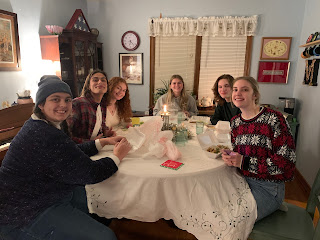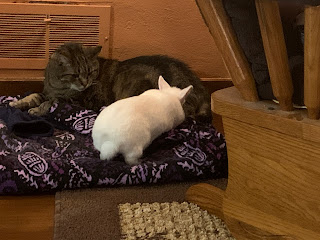And so the books of 2021 come to an end.
Here’s to a more stable and more focused 2022!
--
Shrill (Lindy West)
I bought this book because of a quote I read online from West – a definition of “trumpet” that had me laughing for days – but this isn’t the book that was from. While there are flashes of humor in this one, it is mostly a passionate exposition of what it is like to be (in her words) fat, female, and feminist in the modern United States. Hint: it’s not pretty, and if her experiences don’t make you as angry as she is then you’re not paying attention. There are legions of entitled trolls – overwhelmingly but not quite entirely men – who regard her body as theirs to own, to savage, and to reject and who are willing to make this clear in brutally callous harassment that borders on and occasionally crosses over into criminal. She describes her reactions to the rape jokes that permeate standup comedy, for example – “jokes” that male comedians often simply refuse to accept are harassment, instead feebly defending them on the grounds that “it’s just a joke” or “you should be able to take it” or some such asshole argument. She describes her growing up, her family, her experiences in love and sex, and all the while in the background is her incandescent anger at being treated as an object – and not a worthwhile object at that. All she has to do is let the trolls speak in their own words – which she does throughout the book – and any sane human being instantly reaches for a baseball bat. The fact that so many bats are not reached for in this country tells you all you need to know about the war on women that is being waged these days. You should be as angry as she is. Damn right you should.
Martini 524 (James W. Smith)
This is an unpublished typescript that one of my students let me photocopy, and it was fascinating. James Smith was a crewmember of a PT boat during WWII and apparently he took copious notes during his time in the service. Eventually he typed them up and gave them to his crewmates, and somehow this came down to my student, who thought I’d appreciate it. And he was right! Smith starts his narrative at the beginning of his training, learning how to man one of the smallest and most fragile warships in the US Navy (PT boats were made of wood, not steel) at a base in Rhode Island. He describes the boats themselves, the crewmembers, and pretty much every aspect of the experience. Afterward he and the rest of the crew of PT 524 (the
Bet Me) were loaded onto a tanker and taken to the Panama Canal, where they worked their way through and got loaded onto another tanker and taken to the southwest Pacific. The task force – codenamed “Martini” – went for a few patrols, made contact with the Japanese forces there, and ended up taking part in the furious action surrounding the recapture of the Philippines, notably the Battle of Leyte Gulf – one of the largest naval battles ever fought. Through it all Smith is an entertaining writer, allowing for the attitudes of his time, and he also describes the daily life on board, the bartering (and outright stealing) of supplies that got you through the days, the shore leaves, and the repairs and training that were a constant part of life on a PT boat. I hope that someday this does get published or at least donated to an archive or museum where it can be more widely known.
Total Oblivion, More or Less (Alan Deniro)
Macy Palmer has come unstuck in time, though in her defense so has everyone else. One day she's your basic early 21st century American teenager living in the Twin Cities in Minnesota, and the next there are Scythian hordes carving up the northern US, an Empire centered on Nueva Roma (somewhere near what used to be New Orleans) in the south, and a deadly plague capable of giving people boils that look like creatures and turning them into paper if stung by wasps. Then it gets weird. For all its post-apocalyptic structure and surrealistic details, this is basically a coming-of-age story set on the Mississippi River. Macy and her family get sent to a refugee camp and then make their escape down the river on a paddle wheeler called
The Prairie Chicken, trying to make it to what was once St. Louis. Along the way they have adventures, nearly die, and the family – ivory tower dad Carson, defeated (and pregnant) mom Grace, older sister Sophie, maddening brother Ciaran – gradually falls apart, particularly after Grace gets the plague, gives birth, and dies. Eventually Macy continues the journey south to Nueva Roma – helped along the way by a TARDIS-like nuclear submarine with a legendary skipper – and gets tangled up in intrigue there. Macy grows up, the world gets only vaguely more comprehensible, and that's life really.
The Invisible Life of Addie LaRue (V.E. Schwab)
Never pray to the gods that answer after dark. Adeline LaRue will spend centuries regretting – though, in some ways, being grateful for – not listening to this advice. As the story opens, she is a young woman in a small village in early 18th-century France, desperate to avoid being married off to someone she does not like and sentenced to the kind of narrow, bounded life this will inevitably bring her. On her wedding day she runs to the woods and prays to the Old Gods for relief, for freedom, and with her eyes shut she misses the sun going down. At that point an Old God – at first known simply as The Darkness though later she gives it the name Luc – answers her prayers, and in exchange for her soul he grants her absolute freedom in the twisted way that such gods interpret things. She cannot be remembered. She cannot leave a mark of any kind. She cannot say her name or tell her story. She cannot die, though she can suffer. She can live like this until she surrenders to him. And – as with Claire North’s
The Sudden Appearance of Hope, which features a similar heroine though without the Old God part of the story – much of the novel is centered on how exactly someone who cannot be remembered can live in a world dependent on memory. She can’t hold a job. She can’t keep possessions or own a home. She simply exists in a never-ending series of nows, punctuated by the cat and mouse game played between her and Luc – cruel and capricious, as the Old Gods tended to be. The story bounces around in time, each chapter introduced by a place and a date, each section introduced by a work of art whose meaning becomes clearer over the course of the book. We watch Addie grow up in her village, meeting her family and the old woman in the forest who teaches her of the Old Gods. We follow her life over the three hundred years of the story, as she navigates first France and then elsewhere, trying to find her place in a world that steadfastly refuses to recognize her. We see her become a story, an idea – ideas, we are told, are wilder than memories and have their own rules – and an inspiration, a muse. And in roughly alternating chapters as the older story slowly catches up, we follow her in 2014 New York City where she meets Henry – the first person she finds since before her bargain with Luc who remembers her, the first person to whom she can say her name and tell her story. Henry, Addie, and Luc’s stories will merge and separate, intertwine and unwind, in a powerful meditation on love and memory and what, exactly, it is that makes us human, in a story that never quite settles into predictability and doesn’t quite end, not really. It’s a wonderful book. I listened to the audio version on a long car ride and as noted I’m never sure whether to include those here, but it’s my blog and I set the rules, so here it is.
Round Ireland With a Fridge (Tony Hawks)
What would you do if you woke up after a night out drinking to discover that you had made a bar bet with a friend – a bet you have no memory of making – that you could hitchhike around the circumference of Ireland in less than a month while accompanied by a dorm fridge? If you're Tony Hawks, you decide to buy a small refrigerator, fly to Dublin from your home in London, and set out. At the outset Hawks finds an ally in Gerry Ryan, a nationally broadcast radio host who adopts this quest as his own and promotes it on his show, and between this and Hawks' own willingness to roll with whatever comes his way it becomes an adventure in the kindness of strangers. He ends up as something of a national figure himself – at one point a group of art students paint "Fridge Man" on the back of his jacket – and as he makes his way counterclockwise around Ireland he runs into all sorts of people willing to give him a ride, take him to the pub, and even on occasion put him up in their own homes. Hawks is an engaging writer and this is a story that seems designed to be told in a crowded and dimly lit pub over a pint or two. It's an older story – this all happened in the mid1990s – but in a frantic and divided age it is good to read something that speaks to a more civilized and welcoming sort of humanity.
The First Ten Years: Two Sides of the Same Love Story (Meg Bashwiner and Joseph Fink)
Meg Bashwiner and Joseph Fink became a couple in New York City in 2009 when they found themselves working together for the Neo-Futurists, an avant-garde theater troupe. A decade later they were married, touring with the
Welcome to Night Vale company that they had founded, and living in both upstate New York and Los Angeles. This is, in some ways, the story of that decade. Each of them wrote one chapter for every year of their relationship without consulting the other. And then they put those chapters side by side so you can see the differences in emphasis, in what each felt was worth remembering about each year, about how sometimes even the events and descriptions don’t match. In some ways, though, that’s the main point – how relationships grow and thrive, despite challenges and despite the fact that each participant is seeing things and remembering things in their own way. It’s a sweet story in many ways – their relationship has to survive a great many challenges, from their own awkward steps toward becoming a couple to the vast stresses and strains of running a touring performance company with no experience or training for it, and they do so with an open sense of wonder and deep affection for each other that permeates each page. Both Fink and Bashwiner are good writers – Fink is more aphoristic and has a better sense of how to put words together, but Bashwiner has the better ability to get to the emotional heart of the matter and is the better storyteller – and it’s a lovely little book that way.
Atomik Aztex (Sesshu Forte)
I bought this book for half a buck at a library sale because the title was interesting and even now having read it I’m still not sure if it was money well spent or not, but sometimes you just have to succumb to the sunk cost fallacy and finish what you started. The plot of the book is complex, largely because there are many layers of parallel universes that seem to blend and separate largely at will, but as near as I can figure out it centers on an Aztec warrior named Zenzontli – a man with an unwarrantedly high opinion of himself, as the other characters are at often pains to point out, who ends up in all sorts of trouble in many and varied ways. The key conceit of the book is that the Aztecs stumbled across the secret of parallel universes powered by human sacrifice, so whenever they are threatened they can simply skip to the ones where they win. But things seem to be breaking down, and Zenzontli keeps shuttling back and forth between a universe where he is a noble Aztec lord in Mexico (which, somehow, ends up with him and a troop of warriors fighting Nazis in Stalingrad) and a universe where he is a slaughterhouse worker in Los Angeles trying to unionize the workforce. There’s precious little to differentiate the two universes except spelling – the noble Aztec lord insists on using k’s and x’s in odd places (thus the title) – and Forte is one of those authors who views himself as experimenting with the novel’s form when mostly he’s just writing five-page-long paragraphs that deliberately defy easy comprehension, which I am sure he regards as a victory but which get tiresome for the reader. It’s a short book but it feels much longer, and I don’t expect I will ever read another of Forte’s books.
The Long Haul (Finn Murphy)
This is another one of the books that I listened to as I traveled from Wisconsin to Philadelphia this year, but I’ll count it. Finn Murphy was (is?) a “bedbugger” – a trucker who specializes in long-haul moves. They are, if he’s correct, the bottom of the social pyramid among truckers, but he loves his job and his life and he wouldn’t have it any other way. He tried at one point, in fact, but ended up coming back. He starts his story as a kid in Connecticut, working at a gas station next to a trucking company and idolizing the movers and drivers who worked next door. Eventually he joins them and launches his own career as a driver – much to the dismay of his parents, particularly after he drops out of Colby College after his junior year to pursue this. But Murphy is a natural storyteller, articulate and humane, and he gives a fascinating view of both the world of long-haul moving truckers and the people he deals with – the “shippers” whose stuff he hauls as well as the crews he hires. This was a fun book to listen to and it succeeded in making me think more about the people I see on the road and how their lives are set up.
Just the Funny Parts (Nell Scoville)
Nell Scoville is a writer. She started writing for magazines and eventually someone told her that she should write for television and that ultimately became her career. She divides her career into four phases: 1) Who is Nell Scoville? 2) Get Me Nell Scoville! 3) Get Me a Younger, Cheaper Nell Scoville! and 4) Who is Nell Scoville? and she works her way through a long and varied career as the only woman in too many rooms. It’s a funny book – she’s a genuinely talented comedian and writer and she’s hung out with a lot of similarly talented people, many of whom she quotes – but there’s a hard edge of feminism underneath it, as she recounts the sheer vulgar sexism that is the lot of women in her field. How she managed to get through her career without slapping someone who richly deserved it I do not know. She likes the shows she works on (mostly), and there are people she adores (such as Lily Tomlin) and people she doesn’t – Dave Letterman in particular comes off as a deeply ambivalent figure in profound ways – and it’s a good book but in the end not a happy one, for all that it works out well for her.
Bourdain: the Definitive Oral Biography (Laurie Woolever)
This is a donut of a book, with substantive commentary encircling a missing center. That center, Anthony Bourdain, died in 2018 – one of the few celebrity deaths that I felt as more than just the passing sadness that one feels whenever someone dies. His longtime assistant, Laurie Woolever, assembled something like a hundred interviews with people who knew him – family, friends, colleagues, coworkers, and the like – and then simply cut and pasted them together in roughly chronological order to form chapters, without adding explanatory commentary or editing for consistency. What emerges is a Rashomon-like portrait of a complex man, a larger-than-life figure in some ways, and above all an addict – if not to heroin, then to work, reading, television, career, or lovers. Perhaps the most heartbreaking line in the book comes when one of those interviewed refers to Bourdain's addictive personality, pointing out that “this is why we’re talking
about him instead of
to him.” Bourdain comes off as a complex and three-dimensional character – loud, generous, incisive, self-destructive, brilliantly talented, sometimes angry, always the center of attention though not always happily, and deeply, deeply human. If there is a villain in this piece (other than his mother, who comes across as cold and grasping) it is his final girlfriend Asia Argento – invariably described by all who mention her at all as manipulative, volatile, controlling, and unhealthy, and directly blamed by many for Bourdain’s suicide. Argento was conspicuously not interviewed for this book, though both of Bourdain’s ex-wives and several of his ex-girlfriends were. It’s a portrait of a man who should still be with us, and the world is a poorer place for his absence.
A Little Hatred: Book 1 of the Age of Madness (Joe Abercrombie)
This is the book where my lack of bandwidth this year really became apparent. It’s a marvelous story told by one of my favorite authors, a writer who genuinely knows how to craft a sentence. It has sharply drawn, three-dimensional characters, a bleak and biting sense of humor, and an intricate and well-crafted plot. And it still took me nearly a month to read, with long periods of getting nothing read at all. That said, however, it was definitely worth the time. It’s a few years after the events of
Red Country and industrialization has come to the Union with a vengeance in a way that feels very reminiscent of 19th-century England. The capital is mostly profiting from it, but in Valbeck – roughly standing in for Manchester, perhaps – there is misery, fouled water and air, and a rebellion planned by the Breakers in the name of the workers. Savine dan Glokta (daughter of Arch Lector Sand dan Glokta, the former government torturer from the First Law Trilogy and now one of the most powerful men in the Union) is one of the winners of industrialization, though – powerful, intelligent, and wealthy, and about to be swept up in the events at Valbeck. Crown Prince Orso, her lover and the wastrel heir to the throne, spends his days wishing he were a better man. Gunnar Broad was a ladderman in the Union army – one of the most dangerous and feared positions in the military – but forced from his home by the Union’s equivalent of the Enclosure Movement he ends up with Valbeck’s Breakers and Burners (two different, though uneasily allied groups), who want reforms for the workers by whatever means necessary. Meanwhile the North is in flames again, as Scale Ironhand’s nephew Stour Nightfall is pushing the Dogman’s Northerners and Union forces out of Angland and burning everything in his path, much to the weary disappointment of his lieutenants and the frantic rage of his opponents, Leo dan Brock and his mother, Finree dan Brock, who commands the Union army there. Rikke, the Dogman’s daughter cursed or blessed (or both) with the Long Eye, finds herself in the middle of it all. From this kaleidoscopic set up Abercrombie will let things spin out as his ruefully self-aware and darkly funny characters try to keep up with events without getting destroyed by them. There aren’t really villains in Abercrombie’s world – just flawed characters working for and against each other for what seemed like good reasons at the time in a worn down world – and that draws you in.
The Trouble With Peace: Book 2 of the Age of Madness (Joe Abercrombie)
Things spiral into chaos in the second installment of this story. The chaos starts small, with the return to something like power for Savine dan Glokta, eventually wed to Leo dan Brock, the hero of Angland for his actions in the previous book. But all is not well in the Union, and the newly crowned King Orso will find his reign tested by the treasonous machinations of his own Closed and Open Councils. Stour Nightfall is now King of the North, except for Uffrith which belongs to a much transformed and far more fearsome Rikke. And with those pieces in play the rebellion against the Crown draws allies and strength culminating in a vast battle that takes up most of the last third of the book and is, for all its size and ferocity, little more than a distraction from the larger story of the Breakers and Burners and their Levelling assault on the Union from within. Events overtake events, and the changing historical models Abercrombie draws from come thick and fast if you pay attention. Abercrombie is a master of shifting points of view and his worn down characters try to make sense of the bleak world they inhabit, usually without much success. While Leo ends up manipulated by everyone around him, Orso and Rikke have grown into independent forces. The conflict will end poorly for pretty much everyone in one way or another, and then with the gently written but nevertheless gut-wrenching twist at the end it’s on to the third book – a task for the new year.
Books Read: 36
Pages Read: 12,045
Pages per day: 33.0
Happy Reading!



















